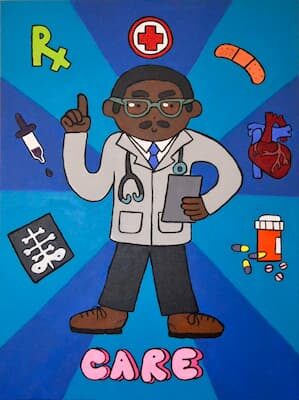Shoulders are at risk of industrial injury and are subject to many workers’ compensation claims. The shoulder is a complex body part. As a result, there are variety of medical treatments that can be applied. One type of shoulder injury is to the rotator cuff. Rotator cuff tears account for over 4.5 million annual physician visits due to rotator cuff tears in the United States .Rotator cuff tears are one of the most common forms of upper extremity injury in the workers’ compensation population. Gutman M J, Patel M S, Katakam A, et al. (March 31, 2021) Understanding Outcomes and the Ability to Return to Work After Rotator Cuff Repair in the Workers’ Compensation Population. Cureus 13(3): e14213. doi:10.7759/cureus.14213. One form a treatment for rotator cuff injuries is surgery.
This article will discuss shoulders, rotator cuff surgeries, and a recent study concerning rotator cuff surgeries.
What Types of Surgeries Can Be Performed on Shoulders?
There are a variety of shoulder surgeries that are available. Shoulder surgeries include rotator cuff tear, total shoulder arthropathy and reverse shoulder arthropathy. Surgery choice is based upon the nature of the injury and what needs to be repaired.
What is the Rotator Cuff?
The rotator cuff is a group of four muscles that come together as tendons to form a covering around the head of the humerus in the shoulder. The rotator cuff attaches the humerus to the shoulder blade and helps to lift and rotate your arm. AAOC
What Are Symptoms of Rotator Cuff Injuries?
The symptoms for rotator cuff tears can include pain at rest and at night, pain when lifting and lowering your arm, pain with specific movements, weakness when lifting or rotating your arm and cracking when moving your shoulder. AAOC
What Is Rotator Cuff Surgery?
A rotator cuff surgery will attempt to repair the torn tendons. This can include re-attaching them to the bone. AAOC
Does Occupation Matter with Respect to Rotator Cuff Surgeries?
Per the study, “the majority of patients with workers’ compensation claims have excellent outcomes from rotator cuff repair. Those patients that returned to work were more likely to work as non-laborers, had better functional scores and greater satisfaction with their treatment. Patients with three tendon tear repairs demonstrated worse functional outcomes than small full-thickness tendon repairs.” Gutman M J, Patel M S, Katakam A, et al. (March 31, 2021) Understanding Outcomes and the Ability to Return to Work After Rotator Cuff Repair in the Workers’ Compensation Population. Cureus 13(3): e14213. doi:10.7759/cureus.14213.
In sum, occupations such as clerical staff will have better results and happiness from the surgery versus physical laborers. Generally, laborers are individuals that work in the construction field, do warehouse work, and do heavy work.
What Were the Study Results with Respect to Dominant versus Non-Dominant Hand?
Yes. The study “found that patients who did not RTW [return to work] had a higher frequency of rotator cuff tear in the dominant arm. This was especially evident when looking at patients who held labor-intensive occupations that required use of their upper extremities. In general, laborers were less likely to return to work than non-laborers (p = 0.032), but when they had sustained a dominant arm injury, the ability to RTW [return to work) was decreased even further in 90% of laborers with non-dominant cuff tears able to return to work compared to only 54% of laborers with dominant arm cuff tears.” Gutman M J, Patel M S, Katakam A, et al. (March 31, 2021) Understanding Outcomes and the Ability to Return to Work After Rotator Cuff Repair in the Workers’ Compensation Population. Cureus 13(3): e14213. doi:10.7759/cureus.14213.
Is Rotator Cuff Surgery Generally Successful with Respect to Injured Workers’ Return to Work?
The study found “the majority of patients achieved excellent functional outcomes and the ability to return to work. Gutman M J, Patel M S, Katakam A, et al. (March 31, 2021) Understanding Outcomes and the Ability to Return to Work After Rotator Cuff Repair in the Workers’ Compensation Population. Cureus 13(3): e14213. doi:10.7759/cureus.14213.
Is Pain a Factor?
Yes, per the study, “shoulder function and shoulder pain scores were highly predictive of ability to RTW [return to work.] Patients who returned to work had significantly higher shoulder satisfaction and shoulder function.” Gutman M J, Patel M S, Katakam A, et al. (March 31, 2021) Understanding Outcomes and the Ability to Return to Work After Rotator Cuff Repair in the Workers’ Compensation Population. Cureus 13(3): e14213. doi:10.7759/cureus.14213.
Do the Number of Tears Operated on Matter?
Yes. Per the study, “three tendon tears have been shown to have the highest rate of re-tear rate and worse functional outcomes. In the current study, while size of tear (p = 0.12) was not predictive of ability to RTW [return to work], patients with three torn tendons experienced the lowest rates of returning to work and the worst functional outcomes.” Gutman M J, Patel M S, Katakam A, et al. (March 31, 2021) Understanding Outcomes and the Ability to Return to Work After Rotator Cuff Repair in the Workers’ Compensation Population. Cureus 13(3): e14213. doi:10.7759/cureus.14213.
What Does This Study Mean for Injured Workers?
Insurance Companies may use this study to make assessments on an injured Workers’ ability to return to work. Specifically, Injured Workers who are laborers who injured had their dominant shoulder operated on will likely have return to work difficulties.
Insurance Companies may be encouraged to authorize additional post-surgical therapy if there are signs of functional improvement. Functional improvement plays an important factor on return to work issues.
Insurance Companies will be concerned in rotator cuff shoulder surgeries involving three tears. Carriers may approach these cases with the view that they may be problematic for both return to work issues and for future medical care needs.
What If I Need Advice?
If you would like a free consultation regarding workers’ compensation, please contact the Law Offices of Edward J. Singer, a Professional Law Corporation. We have been helping people in Central and Southern California deal with their workers’ compensation cases for 27 years. Contact us today for more information.

